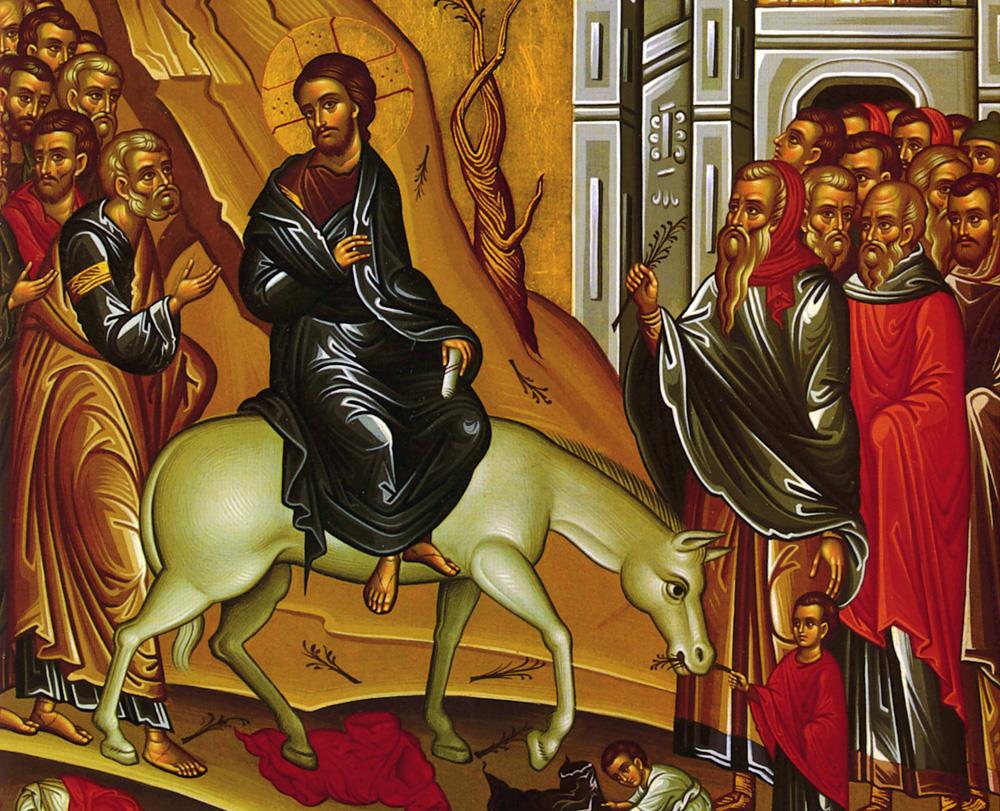
From the beginning of the Divine Liturgy, with the “Blessed is the Kingdom of the Father and of the Son and of the Holy Spirit …” to the end, with the “Blessed is the name of the Lord …”, we can see the entire spectrum of Orthodox worship contained in one key element: Glory and praise (Doxology) of the Triune God. In the middle of the Prayer of Anaphora, there is a great victorious hymn, comprised of two parts drawn from the Scriptures. The first, is the hymn of the Angels, which Isaiah the Prophet heard sung in Heaven: “Holy, holy, holy is the Lord of hosts; the whole earth is full of His glory” (Isaiah 6:3). The second part is what we heard in today's Gospel reading, when the children sang “Hosanna! Blessed is He who comes in the name of the Lord” (John 12:13), on the Lord's entry into Jerusalem. It is not only humanity and the angels who offer doxology to God, but all of creation offers this praise to the Lord. In the words of the Psalmist, “Praise the Lord sun and moon, Praise Him all you stars and light” (Psalm 148:3); “Praise the Lord … mountains and all the hills, fruitful trees and all cedars, wild animals and all the cattle, creeping things and flying birds” (verses 9-10). In short, everything that moves on the earth or adorns it! In Psalm 102 [103] the Psalmist calls also upon his soul to “Bless the Lord, O my soul, and forget not all His rewards” that He has offered to you (verse 2). In Psalm 103 [104] also “Let the glory of the Lord be forever” (verse 31) “I will sing to the Lord all my life” hymns of praise (verse 33).
The natural state of the human being is one that is oriented towards God, glorifying their Creator. It is God who gives us existence and life, and ensures the proper conditions for our survival. It is God Who created humanity to be the most perfect of His creatures, with body and an immortal soul. It by His will that we were made with everything needed to become like Him, and to live with Him eternally in the joy of His kingdom. The supreme proof of His love is in Christ, the very Son of God Who came down to earth and willingly accepted the Passion and death on the Cross, bringing salvation to the world!
With this in mind, how is it possible for anyone (especially Orthodox Christians blessed with the faith) not to praise God? This is why doxology is the primary characteristic of not only public worship, but private prayers as well. The Orthodox faithful begin and end their personal prayer rule with praise of God. This is done not only at fixed times, but should be throughout the day, “at every occasion and hour.” This can be done with a few words: “Glory to God.”
St. Paisios of the Holy Mountain used to offer this advice: Let“Glory to God” never be absent from your lips. Speaking for myself, when I am in pain, I use the “Glory to God” as a pain pill; nothing else comforts me. The “Glory to God” is greater than the Jesus Prayer. If you want to experience paradise in this life, take a look at the great blessings that God has given you, and begin saying “Glory to God.” Glorify God! When someone prays in this way, God will help them. This is because the struggle for humble gratitude attracts the Grace of God, bringing the power of Heaven to a person's aid.
St. John Chrysostom used to say: Glory to God for all things. These words will follow everything that happen in my life. Let us give glory and thanks to God for everything that comes. May all we do be for His glory to the very end of our lives. St. John Chrysostom's last words while in exile were: “Glory to God for all things.”
One may wonder: Should we say Glory to God” even when something bad happens to us? Can we say such a thing when we are unjustly treated, ill or engulfed in turmoil? Does that make any sense? The answer to this comes to us from Job. Is there anybody else who suffered more than Job, a man of great works? Every horrible situation that could happen to a man happened to Job. Job lost all of his property, and his children were killed when their house collapsed. He fell into deep poverty, with no home and on top of that, contracted a horrible disease that made him an outcast from the city. His wife, in her despair, urged him to curse God and die! Instead, Job firmly offered doxology to God: “God has given me everything; God has taken everything away from me; blessed is His Name!” After glorifying God, he was blessed more than before, with renewed health, riches, wealth and more children!
My beloved brothers and sisters, the experiences of life show us that it is only when we praise God for everything (be it pleasant or unpleasant), that our problems seem less painful. This is because of the certainty that the Lord will hear our voices and help us. We should, therefore, joyfully glorify God every day by saying “Glory to God” in all situations. This is especially true for today, as we are all holding the “palms” (tree branches). Let us join those innocent children of Jerusalem in glorifying our Lord as He takes the road to Golgotha to sacrifice Himself for us. May we, also, become worthy to glorify Him on the day of His Resurrection. Amen.





